Everyone remembers the Beach Boys song lyrics, right? “She’s real fine, my 409!” This song always comes to mind when I run across a Chevy with the big-block 409 V-8 that was available between 1961 and 1965. The seller’s 1964 Impala SS has such a motor and literally was a grandma’s car (go Granny!). It has been out of commission for 25+ years but does start and run. It resides on a farm in Pueblo, Colorado and is hesitantly for sale here on eBay where 25 bids have reached $11,701. The seller’s reserve has not been met.
1961 brought the third generation of the Chevrolet Impala, the introduction of the Super Sport (SS) model, and roll out of the fabled 409 motor. The 409 was an extension of the 348, and there are few visual differences between the two, such as the location of the dipstick (the 348 has it on the left, the 409 on the right). Internally, both the bore and stroke were increased, resulting in 360 hp (and later 380) with a single 4-barrel carburetor. By changing to a dual-carb set-up, the engine was capable of one horsepower per cub inch and that is the one that inspired the Beach Boys song. The 409 would eventually be replaced by the 427.
The third-gen of the Impala ran through 1964, the year of the seller’s Impala SS 409. This car comes with a story, which always makes it more interesting. This single-family auto was first driven by the seller’s grandmother, who apparently liked speed but not shifting gears, so it came with the 2-speed Powerglide automatic transmission. She quit driving it, so it sat in an open garage on their farm even after being passed along to the seller’s father. Sometime in the mid-90s, the car relocated under its own power to the farm’s open field. He eventually talked his father out of the car and had every intention of restoring it. However, a recent opportunity to move to Alaska has put the brakes on that dream.
In preparation for letting the car go, the seller gave it a complete tune-up with the objective of getting it to run. Apparently, the last time it did so was in the mid-1990s. After a complete tune-up and some fluid changes, the car did fire up, but he didn’t work on it any further. It will be up to the buyer to take it from there, with a rebuilding of the engine and transmission likely along with a cosmetic restoration. This 409 has the single four-barrel carb set-up. A new owner is going to have to completely redo the interior, especially since the seller has already gone to the trouble of taking out the seats, carpeting, and at least one door panel. The dash cover is shot, and the headliner is falling down.
The body seems to have held up reasonably well, especially since it was exposed or partially-exposed to the elements for several decades. There is a rust-thru spot on one of the quarter panels and a busted blinker light. The color combination of the car is a bit odd, leading me to wonder if the exterior could have had a color change at one point. I’m inclined to think this is a seriously faded Ember Red with a blue/white interior. While looking for rust, the seller removed the carpeting and says the floor is a teal color. So that adds to the color mystery.
Chevrolet sales continued on a positive trend in the ‘60s. Overall production topped 1.5 million full-size cars and more than half (nearly 900,000) were Impalas. The Impala Super Sport had become its own line by then and 35% of the 536,000 Impala two-door hardtops that were sold were SS’s –about 155,000 units. Collectors seem to prefer the more streamlined look of the ‘63s over the boxier ‘64s, but the latter can still bring mid-five-figures, especially if it’s an SS with a 409. The seller’s car is going to need a lot of work to bring it back to its former glory, but if the reserve isn’t too high, it could be worth it. Source: 348-409
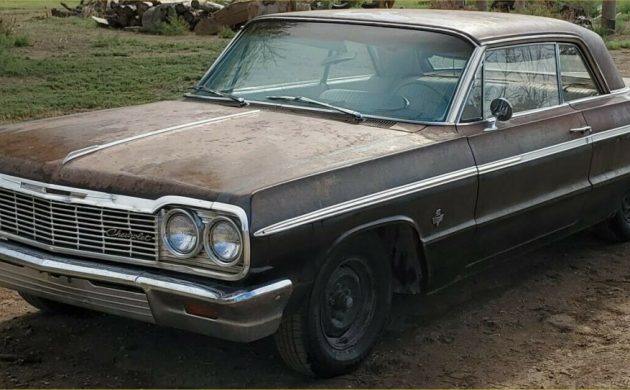
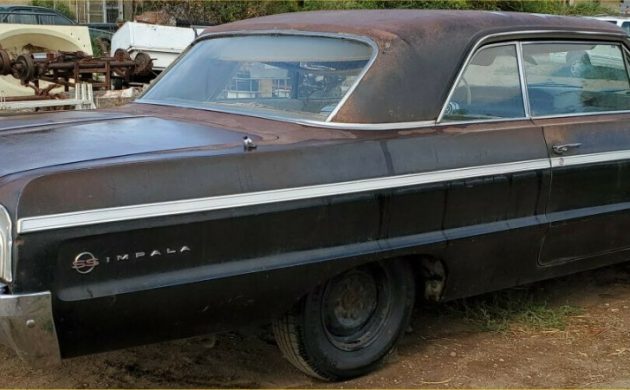
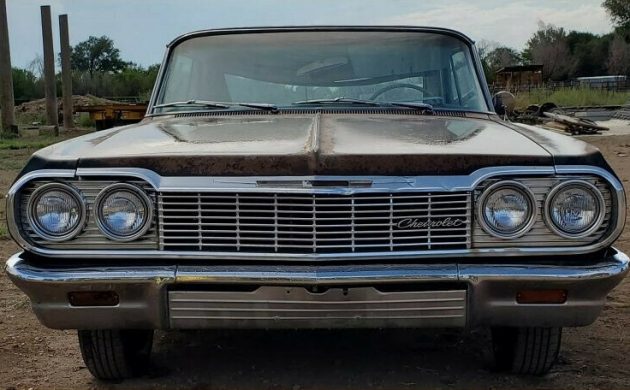
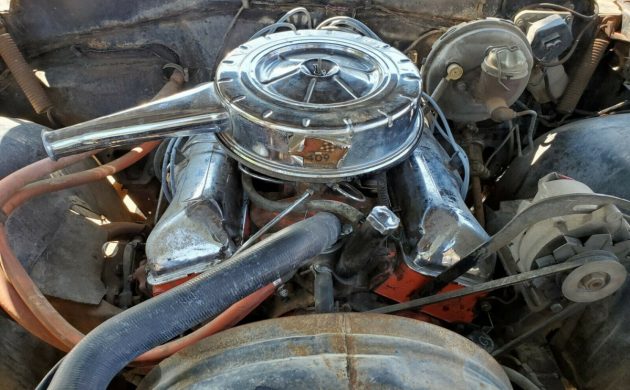
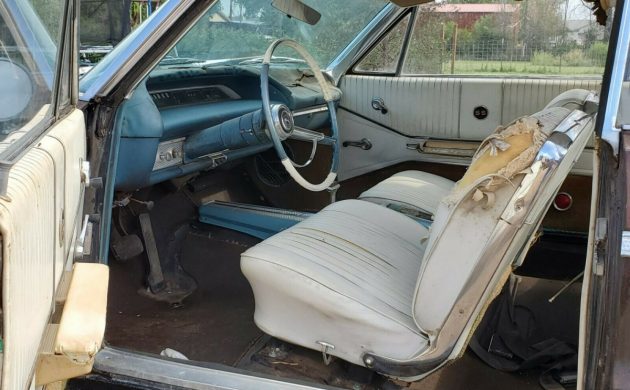
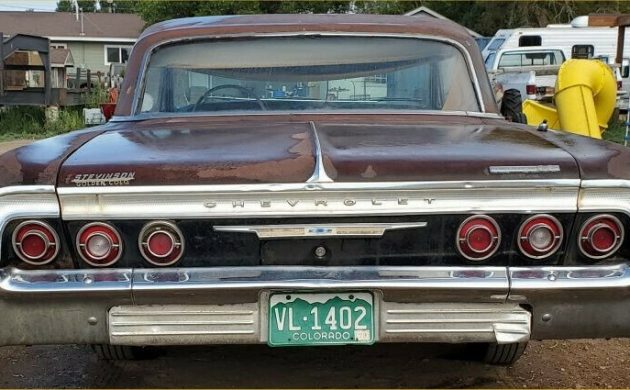






too bad most people don’t know – a car which has sat for years without running should NOT be started until the oil pan is removed and cleaned out……
It kinda, sorta looks legit. I like the font in the description, old school, it reminds me of the “mimeograph machine”. It’s nice that the seller points out that brutal cracked marker light. That stuff always makes me smile.
Always need to check authenticity. Larger blinker fluid reservoir, kinigley pins are forged on these and, if the original mufflers are in place, larger bearings. Those large muffler bearings sound awesome.
I’m a fan of this one, all humor aside.
Why no simple fuel line directly to the carb? – why the multiple branch outlets?
Gotta love the engine turned lower dash & console covers.
The line going over the right valve cover is a hot air tube that runs from the exhaust manifold to the choke and the line running up the front of the engine is the fuel line from the fuel pump to the fuel filter. The curved line runs from the filter to the carb.
Get it mechanically sorted, fix the driver’s seat, install new carpet, leave the exterior as-is and cruise
All that extra hardware on the fuel system looks like a CNG set up. This car looks pretty solid, I’d want to do a hands on inspection but so far the price of admission seems fair.
I thought all 1963 and 1964 true ss had a factory mounted tachometer on the steering column i had one years ago and seem to remember that
They were not on the steering column, they were mounted in/on the dash directly above the steering column. Perhaps std on 4 spd cars (SS would have had nothing to do with it). Opt. on others.
Wish the new owner luck + keep this gem all stock…grandma might come back + haunt the person that modifies this sweet heart of a old girl..keep cars like this stock.
Just my opinion..🙏
Wasn’t a tach standard on all 409 Chevys in ’64?
this is the mild 409 that came out in 64 as its a automatic its first year for a auto in a 409 and it was only 340 hp
I have my Dads 63 SS that he bought new. 409/Powerglide
Actually 63 was the 1st year for the 340 HP 409 with PG or manual trans
There were 3 different horsepower ratings for the proud ‘ 409 ” in 1964 being 340 hp., at 10:00 to 1 compression. The larger rating were 400 hp., with single AFB and the 425 hp., with dual Carter AFB’s. The 400 & 425 horse engines had an 11:00 to 1 compression rating (dome on the piston). Remember, the combustion chamber was in the piston on the 348 and 409 engines with the “W” formed cylinder head.
I had a 62’ SS 4-speed w/ the dull silver gray valve covers not chromium. I see there is part of the decal on the front of the air cleaner I bet that is a 400 horse motor ! Numbers please !
Jon; if this W is original to this ‘pala it can only be the 340hp version as it was the only 409 available with the PG trans
Tach was an option no matter what trans. I’ve never seen a tach with an automatic.
And maybe less than half of the manual trans cars.
As I own a 327 ’64 SS I’m always curious to know what we’re looking at so I had the seller send me a pic of its cowl tag. Hopefully he’ll update the ad with the pics I already received.
I did the decode and it’s built in first week of May ’64(05A) at the St Louis, MO plant (SL). Not very surprising it was Tuxedo Black (900) with Aqua/White interior SS buckets(845).
What I was more interested to learn were its accessory codes:
Group 1; W= tinted windshield
Group 2; M = Powerglide, P = Comfort&convenience group type A, S = rear
antenna; R = rear speaker
Group 3; C = padded dash
Group 4; no
Group 5; O = seat belt delete (though it obviously has a belt on the drivers
side, installed later?)
While it may look rough it’s not really bad – it doesn’t seem to have the typical rear inner wheel well/trunk rot and the hole in the LH quarter looks miniscule compared to others I’ve seen(mine included!). It’ll need alot of attention but has the potential to be a GEM! A complete interior from Ciadella is a 2K deal
I chuckled at the description above where he doubts the color of the interior and though the car was surely red…huh?
Well; gotta admit he wasn’t that far off either – it does look as it’s wearing the color very commonly found on project cars; Surface Rusty Red
The white/aqua interior was available with Azure Aqua (lt), Lagoon Aqua (dk), white or black exteriors–ONLY.
409 were not called big blocks , don’t confuse the young un,s.
They were called “W” motors because of the scalloped valve covers or sometimes truck motor which is what they were originally designed for but mostly just 09’s
FYI, the 409 premiered in 1959. My close friend bought a new Impala 4-door hardtop with a 409 and four-on-the-floor. What a beast it was. But he never came home with a trophy from the drag strip in LaPlace, LA. He insisted on driving, and he really wasn’t tat good.
He had a 348. 409’s were not available until 1961 and continued into 1965 when approximately only 90 were made.
Would make a great C&C “Love Machine” build.
The 409 was replaced by the 396 midyear 1965. 427 came out 1966.
maroon outside with blue inside. that did not happen !!!
.
Hey what is W formed clyinder look like in 409 ? Anybody?
Look at the valve cover.
Hope the new owner gets it running after cleaning it up and enjoys it. It’s rare to find one like this.
My friend had a 56 Chevrolet with a 409 and won many trophies in the 1960’s at Richmond Dragstrip. Another friend said my buddy won every week they went. We always called them “409” or “09” back then. Some people said they were a truck engine, but some of the 409s would run. I think the 62 Chevrolets would race their 409s against the 427 Fords in A Stock back then. I remember the picture of Don Nicholson in Hot Rod magazine in his 1962 Chevrolet 409/409 picking up the front end in A Stock which I think he won that day.
You’re correct the W engine was initially developed to be a truck engine as Chev quickly realized the limitations of their new 265 for future trucks. But it was in the cards that the cars of tomorrow would gain weight, resulting in two different paths in 348 W design.
Engines destined for truck usage would have reliefs in cylinders to lower compression while car engines didn’t have them for the exact opposite reason and were designed with higher CRs. To my knowledge ‘car’ and ‘truck’ engines should have different suffix codes
http://www.348-409.com/
http://www.superchevy.com/features/sucp-0801-348-409-w-engines
The bidding is up to $18,000 and still without meeting the reserve.
How much could he want for it? It needs everything.
A few more inches on the belt, you could get the alternator on the other side of the fender!